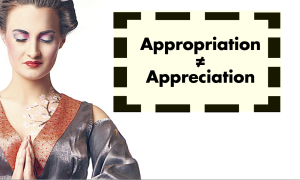Originally published on The Establishment and republished here with permission.
There’s one thing cis and transgender people agree on – trans women and transfeminine people don’t get periods.
Those of us who were assigned male at birth (AMAB) generally came out of the womb without ovaries or a reproductive system that can support a pregnancy, so we don’t bleed every month in preparation for one.
It’s generally seen as one of the net positives about being a transgender woman as opposed to a cisgender gal. Before and after I started transitioning, my cis girlfriends came to me with their tales of woe – bloating, cramps, violent mood swings, nausea – all sometimes too intense for them to reasonably get out of bed.
“You’re so lucky,” they’d moan, and I would shrug sheepishly, implicitly agreeing that I was fortunate to never share in those experiences. That would be impossible. Right?
Imagine my shock, then, when I talked with my friend Ashley last month, just before she went into the hospital for a few weeks.
Nervous about the length of time she would have to stay, she told me the reason for her reticence: “I’m due for my period in a couple days, and that’s going to really suck.”
Uh, what?
Ashley’s a 23-year-old trans girl who’s been on hormone replacement therapy (HRT) for over a year. She takes a cocktail of the antiandrogen spironolactone and estradiol, a form of estrogen.
About five months into her treatment, she began experiencing a predictable pattern of symptom.
First would come the soreness and swelling in her chest along with bouts of nausea. The next day, she’d endure painful abdominal cramping lasting minutes at a time, as well as constant nausea, hot flashes, dizziness, photosensitive migraines, and bloating.
This cycle, she says, lasts for about six to seven days and repeats roughly every five weeks.
If those symptoms sound familiar, it’s because billions of cis women all over the world experience similar symptoms while menstruating.
Along with insomnia, general muscle fatigue, joint pain, acne, and a host of other side effects, all the afflictions Ashley reported are symptomatic of premenstrual syndrome (PMS) and/or premenstrual dysphoric disorder (PMDD).
(Debilitating symptoms can be indicative of endometriosis and shouldn’t be considered a natural part of menstruation for people with uteruses – folks, call your doctors!)
Intrigued by Ashley’s disclosure, I put out a call online for trans women to get in touch with me if they had experienced regular symptoms like hers since they began HRT. It turns out, Ashley’s not alone in her experiences – it’s not impossible for me to develop a “period” after all.
Aspen, a 24-year-old trans girl, said that although she almost always felt nauseous in the morning, she’d recently experienced excruciating “morning sickness” for a nearly weeklong stretch before it abated – almost without a trace.
Still another respondent, who requested to remain anonymous, said they had “a lot of really bad period shits where it’s practically explosive it’s so horrible.” (Menstrual diarrhea isn’t as known or discussed as other symptoms, but it’s definitely a thing – to nobody’s relief.)
After speaking with about ten diversely identified people who identified as having PMS-esque symptoms, I saw only one possible explanation: AMAB trans people can and do seem to experience period-like symptoms as a part of HRT.
Just like cisgender women, our period symptoms range from barely noticeable or almost nonexistent to debilitating.
I haven’t identified a hormonal cycle of my own, but it was clear that others had, and they weren’t limited to feeling sad and wanting chocolate (though Ashley did wryly note that she “had to be talked out of putting chocolate syrup on [her] hot dog” during a recent cycle).
Scientifically, I was puzzled. Were these symptoms strictly psychosomatic, driven by knowing feminization of these individuals’ bodies? Or were they a direct result of the physiological effects of HRT, an awakening of latent femininity in AMAB bodies?
After all, there’s only one gene separating testicles from ovaries in adult humans, and all human embryos are primed to develop ovaries until a chain of genes on the Y chromosome get involved.
Plus, animals of all kinds (like frogs and hawkfish) change sex frequently in response to environmental stimuli. I certainly didn’t consider my informal surveys to be comparable to a clinical trial, but the anecdotal data I rounded up was strong.
In fact, I even heard from a cis woman whose mother was prescribed HRT after having her ovaries removed, and who experienced cyclical back pain, bloating, and frequent urination/defecation – “everything but the bleeding.”
“[My mother] actually has a healthier, regular cycle without most of her reproductive system than I do while still having mine,” griped the respondent.
Given the dearth of medical literature regarding the effects of HRT on transgender people, why wouldn’t it be possible for AMAB people to experience something akin to a bloodless period? After all, side effects like bloating, cramping, nausea, and breast soreness are well-documented side effects of estrogen therapy.
Is it such a stretch to believe that these effects could be experienced cyclically?
This is a phenomenon that clearly requires greater study – in all of my research on the topic, I couldn’t find a single scientific examination of the matter. Perhaps part of the problem is that so few people know about it.
The general cis population is understandably in the dark, because lots of trans people aren’t aware of it as a broad phenomenon either.
Though a few of my respondents had discussed their symptoms in private trans groups online, most had assumed they were the only ones who were experiencing period-like symptoms.
There is one group with strong views on the matter, however. If you listen to trans-exclusionary radical feminists (TERFs), we actually can’t experience period-like symptoms…because, well, we just can’t.
After I put out the call for interviewees on my Tumblr, the TERF brigade leapt all over my post and covered it in some of the most vicious, unprovoked vitriol I’ve ever seen – from accusations of sexism, to claims that those talking about this were “delusional” and “parasites,” to outright threats (“I’ll gladly help them if they want to bleed from their genitals once a month.”).
I was shocked and confused – I had gathered enough anecdotal evidence to suggest a truly fascinating hormonal phenomenon, but these people had no interest in challenging their preconceived notions of what was possible for transgender people (notions that, I’ll reiterate, I used to share as well).
But then again, perhaps this shouldn’t have come as such a surprise to me.
Whether it’s in a conversation with our medical providers, friends, or even immediate family, trans people – AMAB folks in particular – have historically been met with violent opposition when discussing their feelings and medical needs.
We’re often told we’re exaggerating things, seeking attention or sympathy, and that our reality can’t possibly be as we describe it. Sometimes these verbal assaults turn physical. When I asked how these attacks made them feel, Blue laid down some truth:
I’ve always been terrified to mention [these symptoms] to anyone for the reason of feeling as though it wouldn’t go over well with anyone…My neurodivergency alone makes me feel as though I have to slowly kill myself at school or work (when I was in either) in order to be accepted and acknowledged. I don’t respond to criticism well at all, so I’m horrified. It’s an especially odd topic for someone like me, an agender individual, who dreams every night that they might wake up AFAB instead of AMAB, [but] doesn’t really desire to relate to these symptoms in the end. It’s sad that it might not be easy to find a safe way to ever have a discussion on them.
On the other hand, Ashley said she tries to focus on the positive. Although her mother has accused her of exaggerating her symptoms in the past, and she’s afraid to contradict those who say she’s just “looking for attention,” Ashley tries to educate those cis women who say she’s “lucky” not to bleed.
“Well, actually,” she grins, “I don’t have a uterus, but I have some of the downsides.” At the end of the day, she’s glad to have a little more solidarity with her trans siblings now that she knows some of them share her experiences: “It’s good to know I’m not alone.”
Hopefully, one of these days, the medical community will dive into the matter and confirm what Ashley already knows – that period symptoms aren’t just for vaginas anymore.
To read more from The Establishment, check out:
- The Pains Of Being Woke
- The Dangers Of The ‘Cool Girl’ Ideal
- Why Are We Scared To Admit That Pregnancy And Childbirth Can Be Sensual?
Sam Riedel is a freelance writer and editor living in Massachusetts. Her work has previously appeared in Publishers Weekly and Bitch Magazine, as well as on The Establishment, McSweeney’s Internet Tendency, and Barnes & Noble Reads. She is also a former editor at The Mary Sue. You can follow Sam on Twitter @SamusMcQueen, visit her site at samriedel.com, or become part of her interactive poetry project at patreon.com/samriedel.
Search our 3000+ articles!
Read our articles about:
Our online racial justice training
Used by hundreds of universities, non-profits, and businesses.
Click to learn more





















